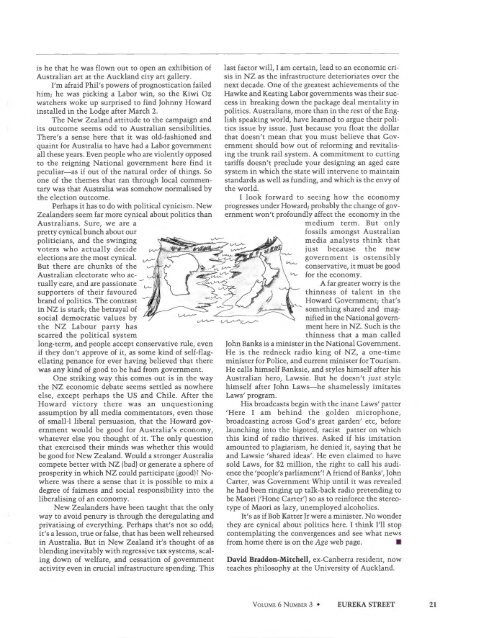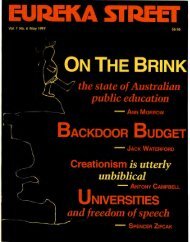Shane Malone - Eureka Street
Shane Malone - Eureka Street
Shane Malone - Eureka Street
You also want an ePaper? Increase the reach of your titles
YUMPU automatically turns print PDFs into web optimized ePapers that Google loves.
is he that he was flown out to open an exhibition of<br />
Australian art at the Auckland city art gallery.<br />
I'm afraid Phil's powers of prognostication failed<br />
him; he was picking a Labor win, so the Kiwi Oz<br />
watchers woke up surprised to find Johnny Howard<br />
installed in the Lodge after March 2.<br />
The N ew Zealand attitude to the campaign and<br />
its outcom e seem s odd to Australian sensibilities.<br />
There's a sense here that it was old-fashioned and<br />
quaint for Australia to have had a Labor government<br />
all these years. Even people who are violently opposed<br />
to the reigning N ational government here find it<br />
peculiar-as if out of the natural order of things. So<br />
one of the themes that ran through local commentary<br />
was that Australia was som ehow normalised by<br />
the election outcome.<br />
Perhaps it has to do with political cynicism. N ew<br />
Zealanders seem far m ore cynical about politics than<br />
Australian s. Sure, w e are a<br />
pretty cynical bunch about our<br />
politicians, and the swinging<br />
~<br />
'C<br />
voters who actually decide w-- ., ' tti'f.;p...e • 1.1.1(~ ~ it!<br />
elections are the m ost cynical. ~ ·<br />
But there are chunks of the · ~~<br />
Australian electorate who ac- ' ~~p - ""--<br />
· tually care, and are passionate ~ '-"'- · . ~~d<br />
supporters of their favoured · ~"" ~ . l<br />
last factor will, I am certain, lead to an economic crisis<br />
in NZ as the infrastructure deterioriates over the<br />
next decade. One of the greatest achievements of the<br />
Hawke and Keating Labor governments was their success<br />
in breaking down the package deal mentality in<br />
politics. Australians, m ore than in the rest of the English<br />
speaking world, have learned to argue their politics<br />
issue by issue. Just because you float the dollar<br />
that doesn't m ean that you must believe that Governm<br />
ent should bow out of reforming and revitalising<br />
the trunk rail system . A commitm ent to cutting<br />
tariffs doesn't preclude your designing an aged care<br />
system in which the state will intervene to m aintain<br />
standards as well as funding, and which is the envy of<br />
the world.<br />
I look forward t o seeing h ow the econom y<br />
progresses under Howard; probably the change of government<br />
won't profoundly affect the economy in the<br />
m edium term . But only<br />
fossils am ongst Australian<br />
{./\..-A-<br />
m edia analysts think that<br />
ju st because t h e n ew<br />
tv~<br />
government is ostensibly<br />
conservative, it must be good<br />
fo r the economy.<br />
A far greater worry is the<br />
thinness of t alent in the<br />
brand of politics. The contrast - ':c__, // Howard Government; that's<br />
in NZ is stark; the betrayal of / · _::~----<br />
social democratic values by<br />
'-''-"-"'"- vt..A.--~~<br />
the NZ Labour party has<br />
scarred the politica l system<br />
long-term, and people accept conservative rule, even<br />
if they don't approve of it, as some kind of self-flagellating<br />
penance for ever having believed that there<br />
was any kind of good to be had from government.<br />
One striking way this comes out is in the way<br />
the NZ economic debate seem s settled as nowhere<br />
else, except perhaps the US and Chile. After the<br />
How ard victory there was an unquestioning<br />
assumption by all m edia commentators, even those<br />
of small-l liberal persuasion, that the Howard government<br />
would be good for Australia's economy,<br />
whatever else you thought of it. The only question<br />
that exercised their minds was whether this would<br />
be good for N ew Zealand. Would a stronger Australia<br />
compete better with NZ (bad) or generate a sphere of<br />
prosperity in which NZ could participate (good) Nowhere<br />
was there a sense that it is possible to mix a<br />
degree of fairness and social responsibility into the<br />
liberalising of an economy.<br />
New Zealanders have been taught that the only<br />
way to avoid penury is through the deregulating and<br />
privatising of everything. Perhaps that's not so odd;<br />
it's a lesson, true or false, that has been well rehearsed<br />
in Australia. But in N ew Zealand it's thought of as<br />
blending inevitably with regressive tax systems, scaling<br />
down of welfare, and cessation of government<br />
activity even in crucial infrastructure spending. This<br />
'-- som ething shared and m agnified<br />
in the National government<br />
here in NZ. Such is the<br />
thinness that a man called<br />
John Banks is a minister in the National Government.<br />
He is the redneck radio king of NZ, a one- time<br />
minister for Police, and current minister for Tourism.<br />
He calls himself Banksie, and styles himself after his<br />
Australian hero, Lawsie. But he doesn 't just style<br />
himself after John Laws-he sham elessly imitates<br />
Laws' program .<br />
His broadcasts begin with the inane Laws' patter<br />
'H ere I am behind the golden microphon e,<br />
broadcasting across God's great garden' etc, before<br />
launching into the bigoted, racist patter on which<br />
this kind of radio thrives. Asked if his im itation<br />
amounted to plagiarism , he denied it, saying that he<br />
and Lawsie 'shared ideas'. He even claimed to have<br />
sold Laws, for $2 m illion, the right to call his audience<br />
the 'people's parliam ent'! A friend of Banks', John<br />
Carter, was Government Whip until it was revealed<br />
he had been ringing up talk-back radio pretending to<br />
be Maori ('Hone Carter') so as to reinforce the stereotype<br />
of Maori as lazy, unemployed alcoholics.<br />
It's as if Bob Katter Jr were a m inister. N o wonder<br />
they are cynical about politics here. I think I'll stop<br />
contemplating the convergences and see what news<br />
from hom e there is on the Age web page. •<br />
David Braddon-Mitchell, ex-Canberra resident, now<br />
teaches philosophy at the University of Auckland.<br />
V oLUME. 6 N uMBER 3 • EUREKA STREET 21
















